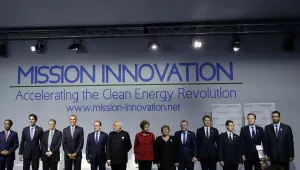Ambassador Richard Morningstar, a former special advisor to President Clinton on Caspian energy issues who is currently a lecturer at Harvard’s Kennedy School of Government, gave an address at the Kennedy School on May 8, 2003, entitled “From Pipe Dream to Pipeline: The Realization of the Baku-Tbilisi-Ceyhan (BTC) Pipeline.”
Morningstar, who, in addition to his appointment as special advisor for Caspian energy issues, also served as Clinton’s special advisor on assistance for the Newly Independent States and U.S. ambassador to the European Union, was instrumental in coordinating the initial efforts of private and governmental institutions involved in the BTC project in the late 1990s. He was one of the individuals who was most responsible for calling attention to the positive role that the pipeline could play in promoting the economic viability of the states of the Caspian basin and Caucasus, ensuring the free flow of Caspian oil and gas to world markets, and bolstering international energy security. The BTC pipeline, once derided as an economically infeasible “pipe dream,” is now a $3 billion project that is under construction and scheduled to bring 1 million barrels of oil per day from the Caspian Sea to international markets by 2005.
Morningstar began by giving some background on historical developments in the Caspian region that prompted Washington to support the BTC pipeline. After the collapse of the Soviet Union in the early 1990s, it became apparent that there were many underexplored petroleum deposits in the Caspian Sea and that the region could become an important alternative source of oil and natural gas. U.S. policymakers like Morningstar realized that building a pipeline from the Azerbaijani port of Baku to the Turkish port of Ceyhan would advance many different U.S. and regional policy goals: making energy resources from the landlocked Caspian region available on the international market; promoting economic development and civil society in the countries of Azerbaijan, Georgia, and Turkey; and ensuring that neither Russia nor Iran developed a monopoly over pipelines from the Caspian region. Planning the BTC pipeline, Morningstar explained, required the U.S. government to work with many different communities—including the leaders of Caspian countries, international energy companies, international financial institutions, and the people of Azerbaijan, Georgia, and Turkey.
Once it became apparent that the Caspian was developing into a major petroleum source, international energy companies and regional governments began contemplating petroleum transport options. The first two pipelines to emerge covered the routes from Baku (near the Azeri-Chirag-Gunashli (ACG) oil field) to the Georgian port of Supsa and from the Kazakhstani oil field at Tengiz to the Russian Black Sea port of Novorossiisk. It was never assumed, however, that these pipelines would be able to handle the entire volume of Caspian oil. There was talk of building more pipelines between the Caspian and Black Seas, but both the United States and Turkey were concerned about the environmental impact that these pipelines would have due to the increased tanker traffic that they would generate on the Bosphorus—an already heavily clogged waterway that serves as one of the main lifelines from the region to the international market.
Washington also feared that expanding the existing Caspian pipeline structure would mean that the government in Moscow, which had long controlled the economic destiny of the Caspian region, may develop a monopoly over the oil pipeline routes in the region and possibly use its economic leverage to hinder the development of independent democracies in Azerbaijan, Kazakhstan, and Georgia. In addition, U.S. policymakers believed that the pipeline could serve as a vehicle to bring economic resources to underdeveloped regions of Azerbaijan, Georgia, and Turkey and would achieve another goal: keeping Caspian pipelines from running south to Iran, which would allow the regime in Tehran to turn off the spigots from the Caspian pipelines at any time.
However, there was substantial opposition initially to the BTC proposal in both business and governmental circles in the United States and the Caspian region. It would require billions of dollars of investment and involve the logistical challenge of running a pipeline across a span equivalent to the distance between New York to Miami— with portions of the line in less politically stable portions of Georgia and Turkey.
Yet Morningstar and others in the U.S. government insisted that the BTC pipeline presented the best means to bring Caspian energy to the international energy market. Maintaining this policy over the past five years won many converts, and an international consortium led by BP Amoco is now in the early phases of constructing the pipeline.
In order to make investment in BTC more feasible, the U.S. government made financing from governmental agencies, such as the Overseas Private Investment Corporation (OPIC) and the U.S. Export-Import Development Bank, available. The Turkish government also guaranteed that the cost for the Turkish section would remain close to its original estimate of $2.4 billion dollars. Once these and other financing options were in place, BP Amoco and the other countries of the Azerbaijan International Oil Consortium broke ground on the BTC pipeline in September 2002.
In the post-September 11 search for improved energy security, Morningstar noted, the BTC pipeline has become an even better idea. It promises not only to contribute to the international energy balance, but also to the collective security and interdependence of the countries of the region and—if managed properly—to the development of civil society in these countries. In addition, Kazakhstan—which is emerging as the largest petroleum producer in the Caspian region—has also begun to express more interest in utilizing the BTC pipeline in bringing some of its oil to market.
Some critics, Morningstar noted, have suggested that the United States should not deal with Caspian countries until they have demonstrated improvements in the spheres of democracy and human rights, which Morningstar acknowledged are still relevant and serious concerns in the region. Though Morningstar—and his successors—have argued that it is better for the United States to stay engaged and make a good faith effort with these newly independent countries (and Turkey) in order to improve the situation incrementally rather than leave these countries to their own devices and expect them to develop democratic and market institutions without any U.S. assistance. Others have argued that the BTC project violates the principle that policymakers should never be involved in market-oriented decisions, but Morningstar said that the “the only good government is no government” version of international capitalism is not sustainable.
While construction on the BTC pipeline has begun, Morningstar acknowledged that an array of political challenges in the region could still seriously hinder the project. Morningstar identified the resolution of the Nagorno-Karabagh dispute between Armenia and Azerbaijan as a top priority for the security of the region. In addition, a series of succession questions are emerging—neither Georgian president Eduard Shevardnadze nor Azerbaijani president Heydar Aliyev, the only two presidents these countries have known, will likely be in office when the pipeline is scheduled to be completed in 2005.
In closing, Morningstar acknowledged questions about the Turkish government’s relationship with its Kurdish population (who are a significant majority in the southeastern part of Turkey where the pipeline will run) and Georgia’s relationship with its separatist provinces also could jeopardize the pipeline. What is more, the recent war in Iraq could have a substantial impact on the BTC proposal over the next several years: developments in postwar Iraq will have an effect on both Turkey and the shape of the international energy market in the near future. He also mentioned that the United States has not yet found a mutually beneficial policy vis-à-vis Armenia and believes that a settlement to the Nagorno-Karabagh conflict is very much in Armenia’s interest. Morningstar explained that U.S. policymakers are also concerned that the relatively strong support Armenia enjoys in the U.S. Congress could be undermined if it deepens its relationship with Iran.
Q & A
Q: If part of the idea behind BTC is to ensure that the newly independent states of the Caucasus remain independent, what role will Turkey be playing in the region?
Morningstar: It is fortunate that U.S. policymakers have begun to realize the close relationship between Turkey and the other Turkic peoples of the Caucasus and Central Asia, including the Azerbaijanis. That closeness played a major role in the BTC negotiations. There were times when I would be sitting in Turkish President Suleyman Demirel’s office because I was encountering a problem with a certain aspect of the BTC negotiations. Suddenly, Demirel would be on the phone to Azerbaijani President Aliyev, and some sort of arrangement would be quickly reached. Turkey’s role in the region can certainly be a positive one, in as much as it has already gone a long way in introducing more Western-oriented democratic and market elements to its Muslim-majority society.
Q: And Russia?
Morningstar: Russia will also be playing a role and has made substantial progress toward this goal by agreeing to a series of bilateral agreements with Azerbaijan and Kazakhstan on the delineation of the Caspian Sea. It was mainly during the early 1990s that the United States was concerned about the government in Moscow exerting too much of its residual influence in the Caspian region. But it still does have a great deal of economic leverage in the region—and that is something that could affect the region, for good or bad.
Q: It seems as though U.S. policy toward the oil-producing countries of the Caspian region is similar to its policy toward China: encourage economic development, and the development of civil society will eventually follow. But does this sort of approach work in national economies that depend more on natural—rather than human—resources? Perhaps the only country with substantial oil resources that is a healthy democracy is Norway.
Morningstar: And Norway, it should be noted, was a democracy before it became an oil producer. The U.S. government has certainly emphasized the need for democracy in Caspian societies, but it also believes that economic development can help to create a broader economic base that can help facilitate the development of democracy.
Has U.S. policy on democracy in the Caspian region been more words than action? Perhaps. But was it possible for democracy to flourish in the Caspian overnight, in the immediate collapse of Communist rule in these countries? Absolutely not. But at the end of the day, the main question is: Would these countries be better off if they never developed these energy resources? And the answer is almost certainly not.
Q: Azerbaijan and Iran have recently been discussing ways to resolve their differences on the Caspian Sea delimitation issue. A recent proposal focused on Azerbaijan inviting Iran to become a joint partner in some disputed oil fields that BP Amoco is developing in the southern Caspian Sea. How would this change U.S. policy in the Caspian region, particularly with regard to the U.S. Iran-Libya Sanctions Act (ILSA) that is designed to prevent foreign companies from investing in the Iranian energy sector?
Morningstar: Very interesting question. It is definitely in the United States’ interest for Azerbaijan and Iran to be on good enough terms to maintain the strategic balance in the region. I don’t know whether the U.S. government would feel compelled to enforce ILSA against a joint Azerbaijani-Iranian energy venture. The U.S. government has often granted ILSA waivers to European companies that are exploring Iranian oil fields, because it would be very hard to completely prevent this type of exploration from happening. One of the main goals of ILSA, however, has been to make sure that no foreign companies help Iran develop infrastructure that would allow it to have greater control over oil distribution—such as pipelines from Caspian oil fields to Iranian ports.
If part of the idea of encouraging the Caspian basin to become an energy-producing region is to help to lessen the influence of the Middle East, then it would be counterintuitive to allow Iran to play a greater role in energy development in the Caspian region. But as for the specific question of whether the U.S. government would apply ILSA sanctions against a joint Iranian-Azerbaijani venture in the Caspian Sea, we’ll have to wait and see.
Q: What happens to the BTC pipeline project if there is a sudden transformation in the leadership in Azerbaijan? There have been many reports lately about President Heydar Aliyev’s health and its impact on his ability to lead the country.
A: Yes, there is a lot of discussion of what will happen when Heydar Aliyev is no longer president of Azerbaijan—whether that transition is imminent or whether it occurs over the next couple of years. But as long as there is some political stability in the country—which could come from the election of either Heydar’s son Ilham Aliyev or another politician on the Azerbaijani national stage to the presidency—there would still be substantial interest on the part of investors in seeing the BTC pipeline through to completion.
Q: Is promoting democracy the highest U.S. priority in the Caspian region?
A: It’s not clear that promotion of democracy is the highest priority in the countries of the Caspian region, but it needs to be a very high priority. The U.S. effort to promote democracy in the region is a difficult process—not so much because of bad faith on the part of the United States, but because the United States is still learning how to do this sort of thing.
The only way that democratization and market reform work is if people within societies see incentives for making these transformations. The region where these incentives were most apparent—and where democratization was most successful—was Eastern Europe. And this is due in large part to the fact that the countries of Eastern Europe had a specific goal in mind: accession to the European Union. Democratization and market reform can be more difficult in places like the Caspian basin where there are not as many clear benchmarks in place.
Please note that this is a summary of the event and not a transcript.
Summary by John Grennan, Caspian Studies Program
For more, see: http://www.ksg.harvard.edu/news/news/2003/pipeline_051503.htm
Photograph by Jeanie Barnett
Richard Morningstar, Brenda Shaffer



